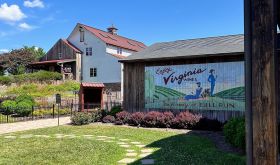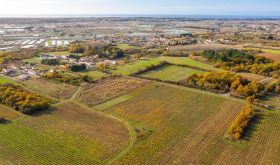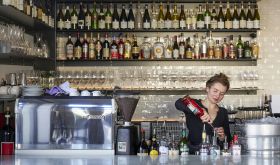Many of those of us who have been lucky enough to visit the world's wine regions agree that South Africa is blessed with the most obviously beautiful wine country. It also has the advantage, despite the recently strengthened rand, of offering relatively good value.
For most European visitors there is the disadvantage of a long overnight flight, but getting off a plane early in the morning is far less painful where, as here, there is no serious time difference. And Cape Town airport is less than half an hour's drive – none of it through the city – from the nearest winery.
The great majority of the country's more than 300 wineries are packed into a small triangle of almost painfully stunning country round the pretty towns of Stellenbosch, Franschhoek and Paarl. Green, vine-bedecked slopes flank sudden rises of craggy mountain ranges which seem expressly angled to catch the rising or setting sun. The only visual blight, particularly shocking for the first-time visitor, is the still-obvious, if steadily narrowing, economic divide between the whites and the rest.
Another attribute of Cape wine country is the significant and increasing proportion of vintners who believe in offering their visitors solid as well as liquid matter. (Wine tasting activates the digestive system, leaving it gasping for food after only a few tastes. It is also much healthier to taste wine on a full rather than an empty stomach.)
As in New Zealand, a restaurant is becoming de rigueur in winery planning – and in wine country there are many other casual eat-outs, as they are tellingly known locally. Particularly recommended pit stops for the hungry wine taster include the deliciously relaxed 96 Winery Road, run by Ken Forrester of the eponymous winery just off the road between Somerset West and Stellenbosch and the super-cool and highly innovative restaurant at the breathtaking new Tokara winery on the slopes of the Simonsberg mountain, already established as a luxurious bolthole for discerning locals.
Nowadays there is no shortage of accommodation (stay-overs) in wine country, with Le Quartier Francais in Franschhoek and the impeccable service and cuisine of the Grande Roche in Paarl being the most obvious choices for sybarites. Be warned, however, June to August comprise the rainy off-season in South Africa's wine country, with vintage time in sunny February and March being high season.
No other wine region in the world can offer such a comprehensive pocket book for tasters and tourists as the annual John Platter wine guide available from www.platterwineguide.co.za.
Julie Arkell adds:
Apart from the incredible friendliness of the people, the stunning scenery and, of course, plenty of gloriously hot sunshine, there are three very good reasons for going to Cape Town during their spring/summer/autumn.
Firstly, it's a completely painless journey from the UK by long-haul standards. The flight may take 13 hours or so, but it's overnight and because there's only a (maximum) two-hour time difference, you arrive having eaten dinner at dinner time, breakfast at breakfast time and, with luck, rested from a decent number of hours of sleep. I flew with British Airways (exemplary service), but I gather that South African Airways hand out upgrades like candy. I can't say anything good or bad about Virgin because I have no idea what they are like on this route though I do know that they don't yet operate a year-round service to Cape Town.
The second good reason for going to Cape Town (or anywhere else in South Africa for that matter, swish game parks notwithstanding, perhaps) is that everything is so inexpensive by UK standards. For example, you can occupy a double room at a top-class hotel for well under £50 a night (and this includes breakfast), less if you haggle in advance. You can eat and drink extremely well for a song (the third good reason for going), hire a car for peanuts and, for next to nothing, can stock up on all those wonderful African artefacts that have suddenly become so trendy.
If you're going straight into Cape Town on arrival and have decided not to hire a car at the airport, there are shuttle vans to take you to your hotel. It will strike you as being somewhat disorganized, but it works! This isn't a free service, so remember to take some rands with you, though there are plenty of ATMs around if you forget.
Arriving early in the morning often poses problems when it comes to checking into popular hotels where rooms won't be ready, but the Commodore (tel +27 (0)21 415 1000, email hrcommod@legacyhotels.co.za) has it cracked. They take care of your luggage, offer complimentary, much-needed tea or coffee and then steer you to their transit lounge, a squishy sofa-filled room with newspapers, magazines and telly, and a very welcome shower suite complete with fluffy towels and hair dryer. The great thing about this facility is that you can use it in reverse on the day you fly home (evening outbound flights appear to be the norm).
This particular hotel, however, is just a five-minute walk from the Victoria and Albert Waterfront, the 'where it's happening' part of Cape Town, packed full of shops, restaurants, music and people, so step out to give it a recce if you feel so inclined. I quite happily filled in time by visiting the aquarium and by taking a half-hour boat tour of the harbour. This latter is a great way of getting close to the seals that inhabit the local waters and offers a breathtaking introduction to Table Mountain.
Ah, now, Table Mountain. Yes, you must go to the top of it. The outlook is fantastic and you should take a picnic and spend a whole day up there walking. But there are only two ways of reaching the top. You either hike up (long, gruelling and really only suitable for hill-walking pros), or take the cable car. I opted for the latter, in spite of being the worst cable car passenger on earth (I usually sit on the floor!). Having parted with my cash, I took the lift up to the 'despatch' area and saw what I was letting myself in for: to me, it looked like a sheer vertical climb on a single steel rope (this is not the kind of cable car that bounces over pylons) and I very nearly balked at the whole idea. Worse was to come. I ended up being herded into a spot on the outside edge of the revolving platform that forms the inside of the cable car. This provides a 360-degree view whilst you are making the six-minute ascent/descent – great, except for the fact that every other windowpane had been removed, ie, there was nothing but fresh air between me and the big drop!! But I will say this for any fellow cable-car wimps out there: it's well worth the palpitations.
There are plenty of other great things to do in and around Cape Town, but you definitely can't leave without trips to Kirstenbosch National Botanic Gardens, Cape Point (stop at Boulders Beach en route to see the penguins and visit the secondhand china shop in Kalk Bay if you are a collector) and Robben Island, where Nelson Mandela was incarcerated. If you're lucky, you'll be taken on a tour of the prison by one of its former political inmates. A truly salutary experience.
Top tip: if you have family/friends/contacts in SA, ask them to book hotels/car hire/game park visits. It can be much cheaper.
Julie Arkell writes:
Less than an hour's drive from Cape Town brings you to the vine-studded region that yields the vast majority of South Africa¹s quality wine. And it is an absolutely beautiful place, a landscape of mountains and valleys that catches the sunlight this way and that, ever-changing in colour and always uplifting rather than menacing.
The wine routes are well marked on local road maps and are well signposted on the roads themselves (centred around Stellenbosch, Paarl and Franschhoek, towns that deserve visiting in themselves), and most of the wineries are geared up to visitors, so you can do the cellar tour, taste and buy very easily.
My base for copious winery visits was the fabulous and extremely affordable Village at Spier, not far from Stellenbosch (tel +27 (0)21 809 1100, web www.spier.co.za). I don't know how many acres (or should I say hectares?) it occupies, but it is far more than a simple hotel. There's nothing high-rise about it for a start. The well-appointed and superbly serviced accommodation is based on a two-storey 'village' concept. There are three restaurants of varying formality (with golf buggies to take you there). The most interesting is the Jonkershuis that offers typical (and very good) Cape Malay cuisine. The bar staff don't have a clue how to mix a Margarita, incidentally, but somehow this doesn't seem to matter when you're there.
The standard souvenir shop is in evidence, plus there's an interesting wine shop and a delightful farm stall, and Spier even has its own railway station, amphitheatre and vineyard. But by far the most exciting site of the complex is the cheetah enclosure, dedicated to the conservation of this cat (not a Big Cat because they purr rather than roar and, boy, do they purr!). For a small price, you can even go into the pens to stroke these hand-reared animals, which is an incredible experience if you haven't done it before (and I haven't come across anywhere else where you can do this).
Booking accommodation in South AfricaJulie Arkell (with too many X chromosomes to be a cricket fanatic) writes:
Booking accommodation for a three-week holiday in South Africa this coming February should have been a cinch, I thought. After all, I had planned our itinerary carefully (Cape Town-Garden Route-Cape Winelands), knew precisely where I wanted us to stay and for how long, was armed with the relevant email addresses and phone and fax numbers, and thought I was tackling this job admirably well in advance (I started hitting the computer and phone keys last October).
What I hadn't taken into consideration, however, was the World Cup Cricket. What a nightmare! It seemed that everything everywhere was already booked up. In some cases, my chosen hotels could only provide accommodation for part of the duration of stay required, and/or could only offer their most expensive (and out of our price league) rooms. I began to think that we would end up spending much of our holiday sleeping in the hire car.
Well, thank goodness for the internet. Myriad searches and research via the various official tourism sites finally led me to a fantastic online booking agency, www.uyaphi.com. They really couldn't have been more helpful, efficient and friendly, with a personal service that would be hard to beat, I reckon. I told them where we were aiming to go and when and for how long, gave them our budget and emphasized that we wanted to ring the changes in terms of style of accommodation. In no time at all, they came up with a list of suitable suggestions, in all cases referring us to the websites of the accommodation concerned so that we could take an online look at the various options on offer. They double-checked that we really did intend to undertake a six-hour drive on a single day. And once we'd settled on our choices, they went ahead and booked it all on our behalf. Confirmation followed by email (with reassuring reservation numbers), coupled with plenty of other invaluable information (directions, distances, local activities and facilities, what to take, and so on). And (as far as I can tell, judging by the room rates quoted on the individual websites of the hotels in question) all of this was completely fee-free to us.
The only downside (if you view this as such) is that you are required to pay for the accommodation upfront. But given the circumstances, the peace of mind offered by knowing that everything has been fixed up more than outweighs the tiny amount of interest we have lost by withdrawing money from the savings account slightly earlier than envisaged.












